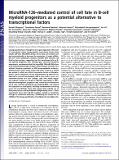MicroRNA-126-mediated control of cell fate in B-cell myeloid progenitors as a potential alternative to transcriptional factors
Author(s)
Okuyama, K.; Ikawa, T.; Gentner, B.; Hozumi, K.; Harnprasopwat, R.; Lu, J.; Yamashita, R.; Ha, D.; Toyoshima, T.; Chanda, B.; Kawamata, T.; Yokoyama, K.; Wang, S.; Ando, K.; Lodish, H. F.; Tojo, A.; Kawamoto, H.; Kotani, A.; Lodish, Harvey F; ... Show more Show less
Download13410.full.pdf (999.2Kb)
PUBLISHER_POLICY
Publisher Policy
Article is made available in accordance with the publisher's policy and may be subject to US copyright law. Please refer to the publisher's site for terms of use.
Terms of use
Metadata
Show full item recordAbstract
Lineage specification is thought to be largely regulated at the level of transcription, where lineage-specific transcription factors drive specific cell fates. MicroRNAs (miR), vital to many cell functions, act posttranscriptionally to decrease the expression of target mRNAs. MLL-AF4 acute lymphocytic leukemia exhibits both myeloid and B-cell surface markers, suggesting that the transformed cells are B-cell myeloid progenitor cells. Through gain- and loss-of-function experiments, we demonstrated that microRNA 126 (miR-126) drives B-cell myeloid biphenotypic leukemia differentiation toward B cells without changing expression of E2A immunoglobulin enhancer-binding factor E12/E47 (E2A), early B-cell factor 1 (EBF1), or paired box protein 5, which are critical transcription factors in B-lymphopoiesis. Similar induction of B-cell differentiation by miR-126 was observed in normal hematopoietic cells in vitro and in vivo in uncommitted murine c-Kit+Sca1+Lineage− cells, with insulin regulatory subunit-1 acting as a target of miR-126. Importantly, in EBF1-deficient hematopoietic progenitor cells, which fail to differentiate into B cells, miR-126 significantly up-regulated B220, and induced the expression of B-cell genes, including recombination activating genes-1/2 and CD79a/b. These data suggest that miR-126 can at least partly rescue B-cell development independently of EBF1. These experiments show that miR-126 regulates myeloid vs. B-cell fate through an alternative machinery, establishing the critical role of miRNAs in the lineage specification of multipotent mammalian cells. Keywords: cell fate decision; lymphopoiesis
Date issued
2013-08Department
Massachusetts Institute of Technology. Department of Biological Engineering; Massachusetts Institute of Technology. Department of BiologyJournal
Proceedings of the National Academy of Sciences
Publisher
National Academy of Sciences (U.S.)
Citation
Okuyama, K. et al. “MicroRNA-126-Mediated Control of Cell Fate in B-Cell Myeloid Progenitors as a Potential Alternative to Transcriptional Factors.” Proceedings of the National Academy of Sciences 110, 33 (July 2013): 13410–13415 © 2013 The Authors
Version: Final published version
ISSN
0027-8424
1091-6490